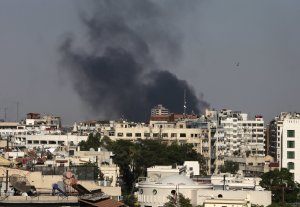oped: Let Russia and China take care of the Syria fiasco...it is their mess not ours...how about a real target of opportunity...one that is the real threat to US and Israel well being...Irans nuke facilities! Now that would make sense!

by: Olivier Knox
The White House settled last week on an interesting counter to the growing chorus of voices saying “your Syria policy has failed.” No, came the response, it just hasn’t succeeded yet.
“We have not attained our goal yet here, which is the removal of (Bashar) Assad from power,” spokesman Josh Earnest told reporters on Wednesday. “We are seeking that removal not just because it's our preference, but because it's the will of the Syrian people.”
Whether President Barack Obama’s policy is a failure (100,000 dead in a 2-1/2 year civil war) or a success-in-waiting (rebels holding their own in a see-saw battle with Assad loyalists), it seems to have reached a turning point after last week’s alleged chemical weapons attack outside Damascus.
Washington is now consumed with talk that Obama could soon order military strikes against Assad’s regime. U.S. officials have let it be known that American warships are getting into position. The president held what amounted to a war council on Saturday and has spoken to British Prime Minister David Cameron and French President François Hollande, key players whose countries notably played a core role in the air war in Libya. Israel says it’s time to “take out” Syria’s chemical arsenal.
A senior U.S. official summed up Washington's position as saying that "there is very little doubt" that Assad's forces used chemical weapons against civilians and then degraded the evidence before letting U.N. inspectors to their work.
Syria, which denies doing so, has warned the United States against military action, saying that would send a “ball of fire” through the Middle East. Iran has warned the White House , specifically, that it would face "severe consequences" for crossing the "red line" in Syria.
Some specialized media outlets have drawn up maps of likely targets .
But will Obama give the order? Would missiles and bombs tip the balance? Would air strikes be only a prelude for an even more expansive escalation of America’s role, something reminiscent of "Shock and Awe"?
Obama and his aides have taken pains to answer the final question as conclusively as possible. No "boots on the ground. No “no-fly zone.” This is the rare international crisis in which American officials publicly and loudly take options off the proverbial table.
“Sometimes what we've seen is that folks will call for immediate action, jumping into stuff, that does not turn out well, gets us mired in very difficult situations, can result in us being drawn into very expensive, difficult, costly interventions that actually breed more resentment in the region,” Obama told CNN in an interview that aired Friday.
On Sunday, a senior administration official said British press reports that the United States and its partners planned to attack in days was “not accurate.” “The president has not made a decision to undertake military action,” the official said.
If he does, are American (or allied) air strikes likely to be decisive? Here’s Obama on CNN again: “The situation in Syria is very difficult and the notion that the U.S. can somehow solve what is a sectarian, complex problem inside of Syria sometimes is overstated.”
So if he wants to avoid escalating the conflict, fears seeing the United States pulled in further, and isn't sure it would be decisive, why might he give the order anyway?
Obama's policy in Syria has always been more than a simple "get rid of Assad." Months ago, officials said that he worried about ensuring Israel's security, preventing the Assad regime from handing its chemical weapons arsenal to terrorists, and safeguarding the stability of other allies such as Turkey, Jordan and Lebanon.
"There is no doubt that when you start seeing chemical weapons used on a large scale," Obama told CNN Friday, "then that starts getting to some core national interests that the United States has, both in terms of us making sure that weapons of mass destruction are not proliferating, as well as needing to protect our allies, our bases in the region."
In other words, the narrow get-rid-of-Assad goal now overlaps with Obama's broader regional concerns.
Sen. Bob Corker, R.-Tenn, the top Republican on the Senate Foreign Relations Committee, told Fox News Sunday that he expected a “surgical” response.
“And I hope the president, as soon as we get back to Washington, will ask for authorization from Congress to do something in a very surgical and proportional way, something that gets [Assad’s] attention, that causes them to understand that we are not going to put up with this kind of activity,” Corker said.
Obama never sought congressional authorization for the conflict in Libya, and used a controversial parsing of the law to justify that. Polls show that the U.S. public is divided on the merits of intervention in Syria — which makes it politically risky to involve Congress.
"We will continue to consult appropriately with the Congress," a senior administration official told Yahoo News when asked about Corker's comments.

by: Olivier Knox
The White House settled last week on an interesting counter to the growing chorus of voices saying “your Syria policy has failed.” No, came the response, it just hasn’t succeeded yet.
“We have not attained our goal yet here, which is the removal of (Bashar) Assad from power,” spokesman Josh Earnest told reporters on Wednesday. “We are seeking that removal not just because it's our preference, but because it's the will of the Syrian people.”
Whether President Barack Obama’s policy is a failure (100,000 dead in a 2-1/2 year civil war) or a success-in-waiting (rebels holding their own in a see-saw battle with Assad loyalists), it seems to have reached a turning point after last week’s alleged chemical weapons attack outside Damascus.
Washington is now consumed with talk that Obama could soon order military strikes against Assad’s regime. U.S. officials have let it be known that American warships are getting into position. The president held what amounted to a war council on Saturday and has spoken to British Prime Minister David Cameron and French President François Hollande, key players whose countries notably played a core role in the air war in Libya. Israel says it’s time to “take out” Syria’s chemical arsenal.
A senior U.S. official summed up Washington's position as saying that "there is very little doubt" that Assad's forces used chemical weapons against civilians and then degraded the evidence before letting U.N. inspectors to their work.
Syria, which denies doing so, has warned the United States against military action, saying that would send a “ball of fire” through the Middle East. Iran has warned the White House , specifically, that it would face "severe consequences" for crossing the "red line" in Syria.
Some specialized media outlets have drawn up maps of likely targets .
But will Obama give the order? Would missiles and bombs tip the balance? Would air strikes be only a prelude for an even more expansive escalation of America’s role, something reminiscent of "Shock and Awe"?
Obama and his aides have taken pains to answer the final question as conclusively as possible. No "boots on the ground. No “no-fly zone.” This is the rare international crisis in which American officials publicly and loudly take options off the proverbial table.
“Sometimes what we've seen is that folks will call for immediate action, jumping into stuff, that does not turn out well, gets us mired in very difficult situations, can result in us being drawn into very expensive, difficult, costly interventions that actually breed more resentment in the region,” Obama told CNN in an interview that aired Friday.
On Sunday, a senior administration official said British press reports that the United States and its partners planned to attack in days was “not accurate.” “The president has not made a decision to undertake military action,” the official said.
If he does, are American (or allied) air strikes likely to be decisive? Here’s Obama on CNN again: “The situation in Syria is very difficult and the notion that the U.S. can somehow solve what is a sectarian, complex problem inside of Syria sometimes is overstated.”
So if he wants to avoid escalating the conflict, fears seeing the United States pulled in further, and isn't sure it would be decisive, why might he give the order anyway?
Obama's policy in Syria has always been more than a simple "get rid of Assad." Months ago, officials said that he worried about ensuring Israel's security, preventing the Assad regime from handing its chemical weapons arsenal to terrorists, and safeguarding the stability of other allies such as Turkey, Jordan and Lebanon.
"There is no doubt that when you start seeing chemical weapons used on a large scale," Obama told CNN Friday, "then that starts getting to some core national interests that the United States has, both in terms of us making sure that weapons of mass destruction are not proliferating, as well as needing to protect our allies, our bases in the region."
In other words, the narrow get-rid-of-Assad goal now overlaps with Obama's broader regional concerns.
Sen. Bob Corker, R.-Tenn, the top Republican on the Senate Foreign Relations Committee, told Fox News Sunday that he expected a “surgical” response.
“And I hope the president, as soon as we get back to Washington, will ask for authorization from Congress to do something in a very surgical and proportional way, something that gets [Assad’s] attention, that causes them to understand that we are not going to put up with this kind of activity,” Corker said.
Obama never sought congressional authorization for the conflict in Libya, and used a controversial parsing of the law to justify that. Polls show that the U.S. public is divided on the merits of intervention in Syria — which makes it politically risky to involve Congress.
"We will continue to consult appropriately with the Congress," a senior administration official told Yahoo News when asked about Corker's comments.

No comments:
Post a Comment